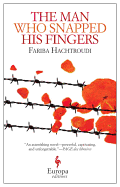
Europa Editions continues to bring high-quality world literature to the United States, now with The Man Who Snapped His Fingers by Fariba Hachtroudi, a French-Iranian author who left Iran after the 1979 revolution. Hachtroudi's book, winner of the 2001 French Human Rights Prize, is timeless in its meditations on totalitarianism and the toll it takes on even those who physically escape its clutches.
Hachtroudi's novel never names the country that serves as its characters' oppressor, in a successful attempt to emphasize the universality of totalitarian systems. The Man Who Snapped His Fingers features dual first-person narrators who trade off chapters and, later, single passages as the narrative draws them closer together. Both remain nameless for the majority of the book: one is called The Colonel, for his rank in the regime before fleeing, and the other is sometimes referred to as "455," the number assigned her in the bowels of one of the Theological Republic's horrific prisons. In this way, Hachtroudi is able to examine both the victim and the culprit of government-mandated crimes.
Hachtroudi's writing is faultless. Here, she explains dictators: "They create a void around them, as if they had some control over death. They exterminate masses of people, and cause the imbeciles to believe that they are buying favors from the Grim Reaper: I'll give you all the corpses you like if you'll give me lifelong credit. Nyet." Outside of masters like Solzhenitsyn, better descriptions of the vile phenomena of tyranny cannot be found. --Hank Stephenson, bookseller, Flyleaf Books

